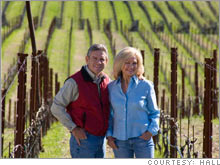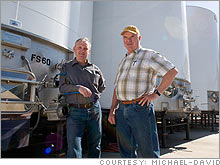Winning in the wine bizThese California vintners are proving that you don't have to be a corporate giant to turn wine into riches.NEW YORK (CNNMoney.com) -- For many, nothing says summer like a chilled glass of Chardonnay. But for vintners Kathryn and Craig Hall, getting people to pour from their bottle has been an uphill battle. The Halls decided to take a taste of the wine business several years ago when they bought part of a vineyard in Napa Valley in 1995. In the years since, they have aggressively acquired more land and built state-of-the-art facilities. Now the couple owns 3,300 acres in total, on which 500 acres have vineyards.
And while many would-be entrepreneurs dream of owning their own vineyard, the reality of running such a business is much more difficult. For the Halls, and many small vintners, the greatest challenge remains "distribution power or the lack thereof," according to the president of Hall Winery, Mike Reynolds. In the state of California, wine producers are required to sell their bottles directly to state distributors - who then sell them to retail stores, where they can then be bought by consumers. Not only does that raise the price paid at the register and cut into wineries' profits, but it also makes it more difficult for smaller brands to get noticed among the pool of popular brands. And in an industry marked by consolidation, small wineries, such as Hall, are forced to compete with corporate giants like Constellation Brands (Charts, Fortune 500), which has snapped up blockbuster wineries like Robert Mondavi and Blackstone. "Financially we don't mean very much to the state wine distributors, compared to Robert Mondavi," Reynolds said. "Distributors look at the bigger brands," he explained, and "our volume does not justify their attention." Hall is currently distributed in 46 states after an intensive effort of grassroots marketing. Today, the Hall winery produces about 12 different bottlings, of mostly Bordeaux varieties, including their popular 2004 Napa Valley Cabernet, which retails for $35 a bottle. Last year, they sold 13,000 cases and they expect to sell about 23,000 cases this year. Although they still have a ways to go, the Halls remain focused on their long-term goal. "If you develop a great wine brand it's something that could outlive you for hundreds of years." Meanwhile, the Phillips family has been farming in the grape-growing region of Lodi, Calif. for generations, but they didn't establish a winery until 1984. They had some success selling their brew locally, but it wasn't until years later that David and his brother Michael dared to tackle the complicated task of wine distribution. The greatest challenge of getting his family-run wine business off the ground was being picked up by state distributors, and "getting people to pay attention to us," said David Phillips, agreeing with Reynolds. "We're constantly on the road, spreading the message," said David who handles the sales and marketing while Michael oversees winery production. But being small also brings advantages, David points out. "Being family run, we still take pride in our art; we look at wine as a way of life, not a commodity." And it's that attitude - along with their big hit: 7 Deadly Zins (a Zinfandel that retails for $17 a bottle) - that has helped the brothers achieve distribution in all 50 states in addition to Canada and Switzerland. Today, the Michael-David Winery owns nearly 400 vine acres and cultivates 15 types of grapes ranging from Chardonnay and Cabernet Sauvignon to Syrah. Michael-David sells 250,000 cases a year, up from only 5,000 cases six years ago. But aside from the numbers, their biggest source of pride seems to be that the family built the business together, and will continue to grow grapes on their own terms. Michael and David's father Don, remains involved in the family's vegetable growing business, while their mother Jeanne tends to the winery's French gardens and pumpkin patch. Michael's wife Kristy is also involved, and their son Kevin is the winery's vineyard manager. The couple's two daughters are currently in college. Meanwhile, David's wife Corene runs the winery's lab and they have two young children, who they hope will join their parents in the business when they get older. "We would all wish to pass along the family farm generation to generation," David said. |
Sponsors
|


